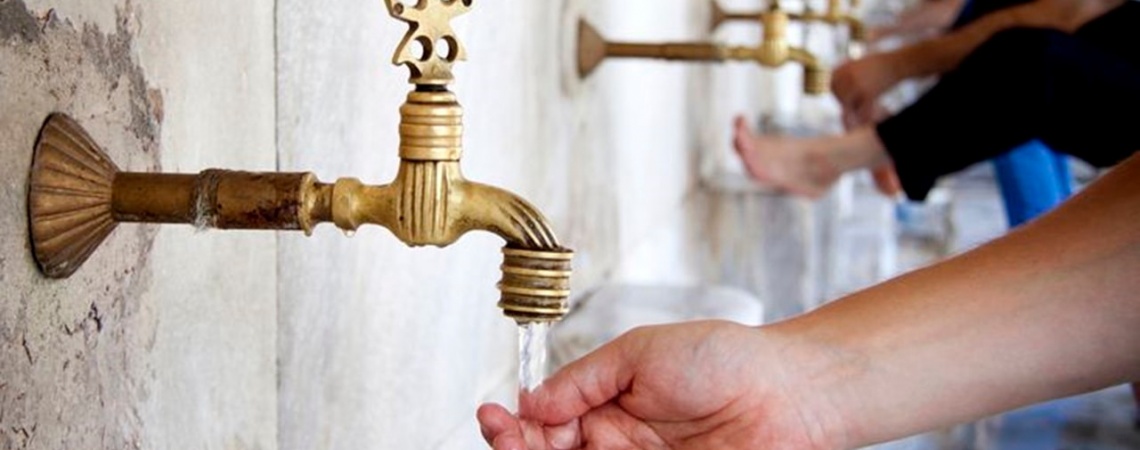There are a multitude of examples in the Sunnah of the Prophet ﷺ, regarding purification and encouraging it by words and actions. The following are some of these.
Purity is half of iman (faith).
Abu Malik Al-Ash`ari
Sahih Muslim (432)
This hadeeth is general and indicates cleanliness in terms of one’s hygiene, however many scholars have mentioned that the purification mentioned in this hadeeth includes physical purification as well as the purification of the soul by abstaining from sin while others have indicated that what is meant here is the prayer specifically and the discussion on these details is quite lengthy.
The brushing of teeth is also highly recommended. It was mentioned that this was the first thing that the Messenger ﷺ used to do upon entering his house.
The miswak (a twig used for tooth brushing) cleanses and purifies the mouth and pleases the Lord
A’ishah
Sunan An Nasa’i (authenticated by Al-Albani)
In another narration, he said;
Were it not that I might overburden my my followers, I would have commanded them to use the miswak before every prayer
Abu Hurairah
Sahih Bukhari and Muslim
Personal hygiene is considered in Islam to be a part of human nature.
Five practices are of the fitrah (natural disposition): circumcision, shaving the pubic region, clipping the nails and cutting the moustache short
Abu Hurairah
Sahih Bukhari and Muslim
In other narrations, something similar is mentioned.
Whoever takes a bath on a Friday and does it well, and purifies himself and does it well, and puts on his best clothes, and puts on whatever Allah decrees for him of the perfume of his family, then comes to the mosque and does not engage in idle talk or separate (pushing between) two people; he will be forgiven for (his sins) between that day and the previous Friday
Abu Dharr
Sunan ibn Majah
Washing hands before eating. Aisha may Allah be pleased with her reported:
“The Messenger of Allah ﷺ, if he wanted to eat or drink, would first wash his hands and then eat or drink.
Aisha
Sunan An Nasa’i (258)
There is also a guideline regarding washing ones hands after eating and before going to sleep. He said ﷺ
Whoever goes to sleep without washing his hands from the traces of fatty foods, exposes himself to illness and should blame no one but himself.
Abu Hurairah
Sunan Abu Dawood (3852)
The above hadith is also reported by Al-Tirmidhi (No.1861), Ibn Majah (No.3267), and Ibn Hibban as mentioned in Al-Mawarid (No. 1354), all of them reported it on the authority of Abu Hurairah except Ibn Majah who reported it after Fatimah, (May Allah be pleased with both of them), No.3296]
Covering vessels of food. Abu Humaid Sa’idi reported: I came to Allah’s Messenger with a cup of milk from Naqi’ which had no cover over it, whereupon he said: Why did you not cover it, even if you had covered it only with a stick? Abu Humaid said that he had been ordered that water skins be tied during the night, and the doors be closed.
Breathing outside of a vessel while one is drinking from it. Anas reported that;
Allah's Messenger breathed three times (outside the vessel) in the course of a drink and said: It is more thirst- quenching, healthier and more wholesome. Anas said: So I also breathe three times in the course of a drink.
Bathing regularly. Muslims should take a complete bath, which includes cleaning all parts of the body, at least once a week if not daily. This is in addition to the regular cleansing as performed in daily ablutions. Abu Huraira reported: The Messenger of Allah ﷺ said:
It is a duty for Allah upon every Muslim to perform a ritual bath at least once every seven days, washing his head and his body.
Abu Huraira
Sahih Bukhari (856)
Using the right hand for eating and the left hand for cleaning oneself. In the Sunan of Abi Dawood it is narrated that ‘Aa’ishah (may Allaah be pleased with her) said:
The right hand of the Messenger of Allaah ﷺ was for his purification and food, and his left hand was for using the toilet and anything that was dirty.
Aa’ishah
Sunan Abu Dawood
Imam Muslim narrated that Salmaan (may Allaah be pleased with him) said:
He ﷺ meaning the Prophet forbade any one of us to clean himself with his right hand.
Salmaan
Sahih Muslim (262)
In another narration on the authority of Ibn ‘Umar (may Allaah be pleased with him) that the Messenger of Allaah ﷺ said:
He ﷺ meaning the Prophet forbade any one of us to clean himself with his right hand.
Ibn ‘Umar
Sahih Muslim (2020)
Using medicine is encouraged Usamah ibn Sharik (may Allah be pleased with him) narrated:
I came to the Prophet and his Companions were sitting as (quiet as) if they had birds on their heads. I saluted and sat down.The desert Arabs then came from here and there. They asked: “O Messenger of Allah, should we make use of medical treatment?” He replied: “Make use of medical treatment, for Allah has not made a disease without appointing a remedy for it, with the exception of one disease, namely old age.”
Usamah ibn Sharik
Sunan Abu Dawood
Not eating the flesh of impure animals such as the pig. Islam even gave us guidelines about food and eating such as not filling the stomach and slaughtering the animal in a way whereby the bad blood is removed from the meat of the animal. In addition, the flesh of the swine is prohibited for consumption because of the filth which is contained within it. Scientific studies prove this. This guidance is mentioned both in the Quran and Sunnah of the Prophet ﷺ
Prohibited to you are dead animals, blood, the flesh of swine, and that which has been dedicated to other than Allah, and (those animals) killed by strangling or by a violent blow or by a head-long fall or by the goring of horns, and those from which a wild animal has eaten, except what you [are able to] slaughter (before its death), and those which are sacrificed on stone altars, and [prohibited is] that you seek decision through divining arrows. That is grave disobedience. This day those who disbelieve have despaired of (defeating) your religion; so fear them not, but fear Me. This day I have perfected for you your religion and completed My favor upon you and have approved for you Islam as religion. But whoever is forced by severe hunger with no inclination to sin - then indeed, Allah is Forgiving and Merciful.
Al-Quran
Surah Al-Ma'idah (5:3)
Not eating too much. Al-Miqdam (may Allah be pleased with him) narrated that the Prophet ﷺ said
“No man fills a container worse than his stomach.A few morsels that keep his back upright are sufficient for him. If he has to, then he should keep one-third for food, one-third for drink and one-third for his breathin
Washing a vessel that a dog has drank from. The following two authentic narrations show us what is to be done regarding the impurity of the saliva of a dog if it drinks from a vessel which humans use.
The Messenger of Allaah ﷺ said: “The purification of the vessel of one of you, if a dog licks it, is to wash it seven times, the first time with soil.”
Abu Hurayrah
Sahih Muslim (279)
There are also practices that Muslims do which do not have a specific proof but fall into the general order of cleanliness and are beneficial for avoiding the harms of impurity such as removing shoes on entering a house. Perhaps these practices have crept into the ways of the Muslims as they are in keeping with other guidelines that promote all round cleanliness.









